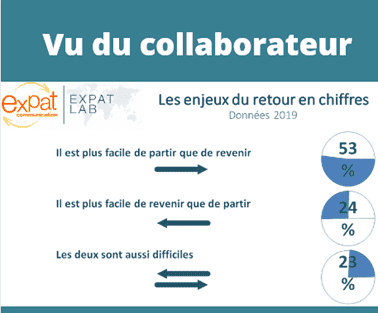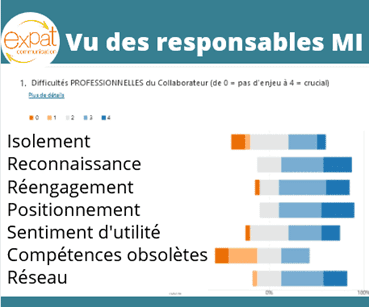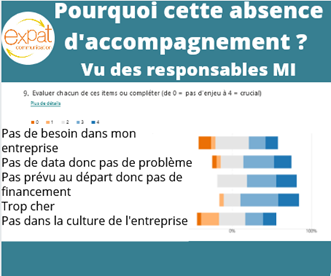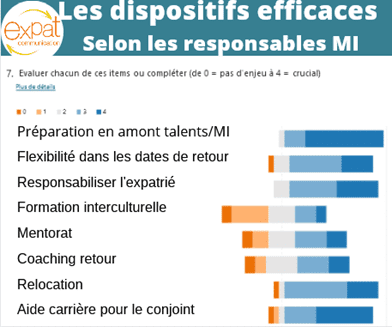Return from expatriation: New perspectives for an old sea serpent
Some topics seem to go in circles. The issue of returning from expatriation is a good example. Regularly mentioned, this topic has seen little progress in recent years. The reports are repeated, pointing out the same problems, evoking the same solutions, and nothing happens or so little. However, with the recent influx of returns caused by the health crisis, and in the context of the ongoing reinvention of international mobility, there is increased interest in this topic, and new perspectives seem to be emerging.
01
Report on the workshop with Expat Communication clients
This workshop took place on March 11, 2021 with the participation of about 20 international mobility managers. We thank again for their valuable interventions:

02
Data that converge to underline how the return is a critical step

After a quick overview, we reviewed the results of the expatriation barometer, which confirmed that the return is the most difficult phase of international mobility for expatriates.
49% of them no longer feel at home in their country of origin. The difficulties are administrative, social, personal and professional.
Feelings of loneliness, lack of recognition, marital separations, depression rates, many indicators go into the red at this point.
Interculturalist Michel Sauquet spoke of the frustration of the incommunicability of the expatriation experience. Without structured feedback, it is impossible to capitalize on the experiences of employees.
Professionally, employees express frustration that their expatriation is not valued (40%). For their part, spouses are faced with the challenge of reviving a career that has become atypical. Finally, the school integration of children upon return is a critical step for many.

When asked to add to this vision, the workshop participants for the most part confirmed this perception. In her general presentation of the issues, Virginie Tillet underlined having measured that between 25 and 30% of expatriate employees leave the company within two years of their return. And according to many participants, these figures are likely to get worse due to the current economic recession.
Another company conducts an annual survey to measure expatriate satisfaction and mood. In particular, they ask the question “Do you plan to return home with peace of mind?” 80% answer in the negative… A consensual, preoccupying observation, and yet, expatriates and MI managers converge to consider that no support is put in place to accompany the return. It is therefore on this major point that we have focused our reflection.
If the return is the most critical phase of the expatriation, why so little support? And above all, how to remedy this state of affairs.
03
Why such limited support
We will see in the rest of this summary that, depending on the company, effective systems exist.
Nevertheless, the main thing is to understand why they remain so little implemented.
When asked about this issue, the 20 MI managers present saw it primarily as a process problem. Without organization at the outset, it is very difficult to plan financing when none of the entities involved (transferor, transferee, IM, talent) feel responsible.

A cost issue and a measurement issue then appear almost equally. No data, no problem. No problem, no solution.
Based on this observation, we can conclude that presenting a solution that was planned from the beginning, with a limited cost and a solid measurement of KPIs would effectively solve the difficulties of the return.
04
Effective mechanisms to accompany the return
Of all the measures discussed, the one presented by Virginie Tillet, Vallourec’s international mobility manager, was unanimously approved. These are bi-monthly meetings between the talent and mobility teams to optimize future returns according to availability and local situations.
This is an effective practice because it brings together mobility teams and talents, and allows situations to be discussed at a very early stage, and with flexibility. Anticipation and flexibility seem to be the keys to success.

In addition, three devices stand out:
- Making the expatriate aware of his responsibilities upstream, in particular through coaching to prepare for his return
- Return to work assistance for the spouse
- The return relocation.
In her speech, Cecilia Kavanagh, with her three hats of IM, expatriate and coach, developed the different processes of a return coaching. In particular, she mentioned the mechanisms that allow expatriates to work on their positioning thanks to a review of their expatriation and networking at headquarters. She also emphasized the importance of working on the perception of expatriation; indeed, expatriates are rarely aware of the gap that exists between their vision of their expatriation and that of those who remain at headquarters. The employee is largely responsible for this perception, just as these sessions help him or her to manage his or her employability upon return.
Her winning combo of return = Anticipation + Preparation + Collaboration
05
Expat Communication's offer on return
To meet these challenges, Expat Communication has developed a range of services for the return:
- Coaching to prepare the employee’s return
- Individual or group return-to-work programs for spouses
- A fascinating video with Pierre-Marie Cusset from Adéo for expatriates
- In May, a major field survey via the expatriation barometer to collect precise figures on the challenges of return. These numbers should serve as KPIs for other programs.
- Outplacement programs when reintegration is impossible.
- Deepening the knowledge of return issues may also be a need for international mobility managers. Our two-day course “Transforming the relationship with expatriates” addresses this need. We can also organize customized workshops.
Expat Communication
Expert in interculturality and coaching
for international talent since 2001.









